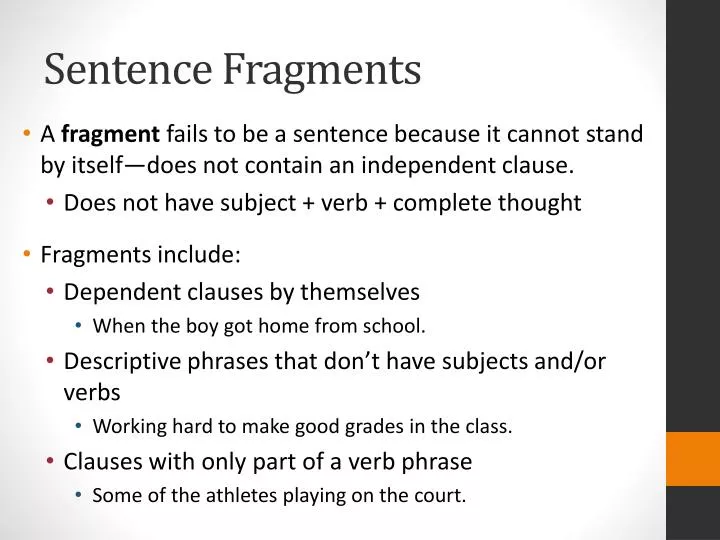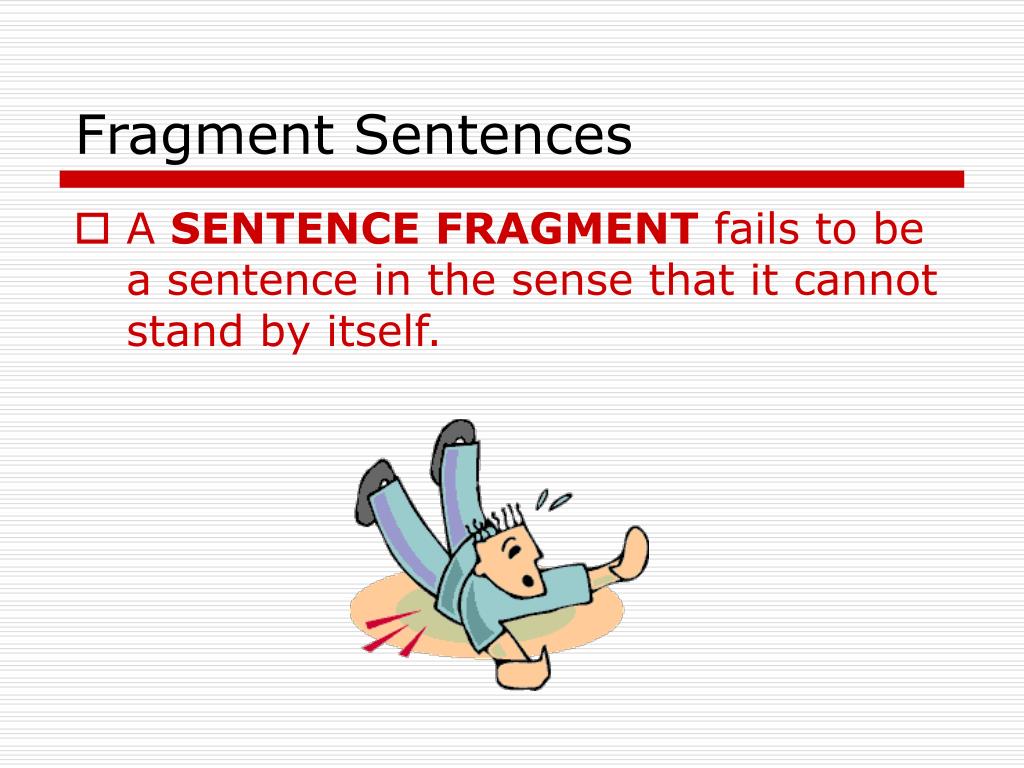
Now we know what the initial clause ("Even though.") is subordinate to.
SENTENCE FRAGMENT DEFINITION EXAMPLE HOW TO
Notice that now we have added an independent clause (a clause that can stand as a sentence on its own) to this sentence. Examples of sentence fragment in a sentence, how to use it. Although they appear complete, they’re only pieces of a sentence detached from an independent clause. found").Įven though he worked tirelessly, he failed to complete his paper. Sentence fragments are clauses or phrases that lack the components of a sentence.

Now our sentence has a verb to match our subject ("the students. Some of the students working in the lab found extra supplies. This group of words has a period at the end and the first letter capitalized, but it's not a complete sentence. We now know what occurred during the time specified by "During the night". A sentence fragment is simply an incomplete sentence it's missing some of what makes a sentence whole. Now that we have looked at these sentences as fragments, let's take a look at how they would look completed *A subordinate clause almost always will begin with a prepositional phrase (e.g., "even though", "despite", "although") This fragment actually contains a subject-verb relationship (he worked), but the phrase "even though" makes it clear that this is a subordinate clause*, and therefore it needs another clause to complete the sentence. Remember, for an -ing verb to be an action, it must be immediately preceded by another verb (e.g., we are working). This clause identifies a subject, but doesn't explain what the subject is doing. Notice that this clause locates something in time/space, but doesn't tell us what is happening. Typically, a fragment lacks a subject-verb relationship.įor example, these are a few sentence fragments: Both are important components of the writing process.A sentence fragment occurs when a sentence is missing one of the key parts necessary for it to be a complete sentence.

Proofreading involves reading for lower-level issues (sentence structure, punctuation, verb tense, etc.), while revision involves reading for higher-level issues (argument, logic, evidence, analysis, etc.). Remember that proofreading and revision are not the same activities. Proofread carefully by reading aloud and paying attention to periods and semicolons. Some common dependent clause cue words include the following: because, although, even if, when, whenever, despite, unless, afterĢ. If the dependent clause is joined to an independent one, it forms a grammatically complete sentence if not, it is a sentence fragment. subordinating clauses).ĭependent clause cue words are words that turn independent clauses ("her notes were carefully crafted") into dependent ones ("though her notes were carefully crafted."). Watch for dependent clause cue words (ie. Use a comma when the dependent clause comes first omit a comma when the independent clause comes first.ġ. Grammatical tip: when joining dependent and independent clauses, comma usage changes depending on clause order (as in the above examples). I drank an excessive amount of coffee today because I stayed up late last night. Helpful tip: dependent clause cues and signals are also know as subordinating conjunctions.īoth of the following sentences are effective solutions to the sentence fragment:īecause I stayed up late last night, I drank an excessive amount of coffee today. With the addition of the word because, it is a fragment: without an independent clause attached, the thought is incomplete, and the reader will not know what occurred because of your late night: In the above example, the clauses on either side of the comma are independent.

John ran quickly toward the exit, he was trying to avoid his ex-girlfriend. Without the dependent clause cue word because, the sentence is independent. A comma splice divides two independent clauses with a comma. The following sentence is a dependent clause fragment. I drank an excessive amount of coffee today.

The following sentence is also a complete sentence (independent clause). The following sentence is a complete sentence (independent clause). Helpful tip: dependent clause fragments are the most common kind of fragment, but there are others, including missing piece fragments (where the subject or verb is missing) These characteristics ensure that a sentence expresses a complete thought. Because it is an incomplete sentence, readers will have trouble making meaning from your words. This means that the basic sentence requires a noun and a verb. It generally consists of a dependent clause that needs to be joined to an independent clause to create a complete thought. Here are some examples of sentence fragments: 'Watching Netflix with my brother and sister.' 'Driving to the beach.' 'Eating pizza for dinner.' 'Every student in my class.' 'To write an essay. Printable version of Recognizing and Avoiding Sentence Fragments (PDF).Ī sentence fragment is, essentially, an incomplete sentence.


 0 kommentar(er)
0 kommentar(er)
